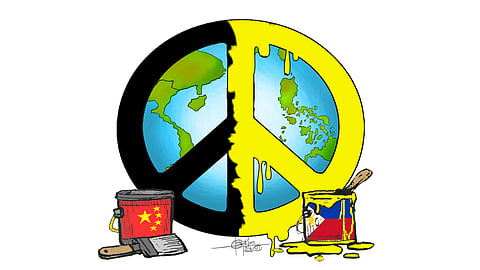
- NEWS
- the EDIT
- COMMENTARY
- BUSINESS
- LIFE
- SHOW
- ACTION
- GLOBAL GOALS
- SNAPS
- DYARYO TIRADA
- MORE

The so-called “gentleman’s deal” that China has been promoting refers to a verbal agreement between leaders of the Philippines and China to uphold regional peace, which was deemed to be in the common interest.
Despite seemingly irreconcilable positions now, not all is lost between Manila and Beijing, a view from a top diplomat guaranteed.
Philippine Ambassador to the United States Jose Manuel Romualdez said talks with China must be predicated on mutual respect which is greatly lacking in the worsening West Philippine Sea conflict.
“I truly hope that people will start looking seriously at what can happen and why. We should find every way to be able to keep peace in the world,” he said.
If anything happens in our part of the world, it will affect everybody, he added.
Reduction of hostilities starts when China respects the country’s rights and “we can supply what our soldiers that are now in the Ayungin Shoal need.”
From there the Philippines can seriously sit down and talk about how to resolve the issues for the long term.
Until confidence is built between the two nations, Romualdez doesn’t see any way out of the stalemate. “We are not the one that is making any offensive move. We are simply defending ourselves, that’s all,” he indicated.
Working with allies and friends is part of the defense strategy. Romualdez said the commitment of the US to its allies is not expected to cool down even if a leadership change happens in Washington DC this November.
“I’m comfortable that whoever the president is in the United States, the same path of playing a major role in keeping peace in the world will be taken.”
The Philippines, thus, takes comfort in the bipartisan support to its actions in the area “and we’re very grateful for that,” according to the country’s envoy.
Peace remains the overarching goal to end provocations over the territorial rift.
“It is a slow progress. We’re trying hard as much as we can to reach out and sit down seriously to talk about the very many issues surrounding the situation we are now in,” Romualdez continues.
Yet, he said some values cannot be compromised. “They are challenging our territorial integrity and our sovereignty. And that is one issue that is to a certain extent, non-negotiable.”
Improved relations start with Beijing respecting the rights of the country.
Non-interference in the rotation and reprovisioning of troops will be an indication that they’re willing to sit down and talk to us seriously.
“Since I was appointed by former President Rodrigo Duterte in Washington DC and he was the chief foreign policy maker. I follow this line that we did not want to be taken for granted by the United States and that we wanted to see how we could work together and simply respect our sovereignty and what is best for our mutual interests,” Romualdez recounted.
He added that about China, President Duterte wanted to reach out and find a way to be able to just have some peace in the area.
“I think his primary concern was to have our fishermen be able to fish in the waters that they’ve been used to doing for hundreds of years.”
“An enemy to none. A friend to all” was the policy at that time.
When President Bongbong Marcos assumed the presidency, he engaged in discussions with President Xi Jinping to establish a high-level communication system, ensuring mutual peace and stability.
Then came the laser incident and the water cannoning. Romualdez said, “And I think President Marcos said it very well when he met with the Chinese ambassador and said that China was making it very difficult for us to be their friend because of what was happening.”
It is all about mutual respect and a recognition that one country does not exist by itself but in a community of nations that have diverse interests but a common goal of peace.
